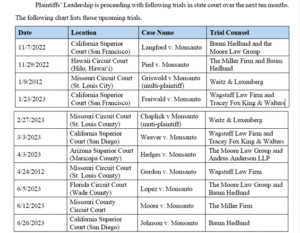Roundup litigation at turning point as Bayer rejects “global resolution plan”
Fresh off a fifth-in-a-row trial victory, Monsanto owner Bayer AG is rejecting a proposed “global resolution plan” put forward by plaintiffs’ lawyers as a last chance to try to settle tens of thousands of pending Roundup cancer claims before a wave of new trials get underway, newly filed court documents show.
The company’s stance comes at a pivotal point in the ongoing nationwide litigation involving plaintiffs who allege they developed non-Hodgkin lymphoma (NHL) from exposure to Monsanto’s glyphosate-based weed killers, such as Roundup.
The group of law firms leading the cases in what is called “multidistrict litigation (MDL)” asked US District Court Judge Vince Chhabria to approve a plan that would set a 60-day window in which both sides would try to forge a final global settlement that would cover the claims of roughly 30,000 plaintiffs.
If no settlement can be reached, the plaintiffs’ firms want the judge to start the process of dissolving the MDL and clearing waves of cases to go to trial in the states where they originated.
The plaintiffs’ law firms say the current court-approved settlement process, which has been ongoing for two years, is too slow and ties plaintiffs into a mediation process that provides only low-ball settlement offers to plaintiffs while delaying trials.
“The offers made within the settlement program appear to be woefully inadequate. Thus, a substantial number of MDL cases remain unresolved by the settlement program, and it is highly unlikely that these cases will be settled absent global resolution or an imminent trial setting,” the plaintiffs’ firms said in a Sept. 1 court filing.
In opposing the proposal, Monsanto lawyers said the current MDL structure should be maintained and the mediation process kept in place. The company lawyers argued that disbanding the MDL and sending “thousands of current and future cases to district courts throughout this country” would “bring chaos to bear.”
The company lawyers said that the majority of cases to date have been resolved and keeping the MDL intact will allow resolutions to continue, “which benefits the litigants and the federal court system.”
“Monsanto does not wish to engage in Plaintiffs’ proposed global resolution plan and the proposed 60-day stay is unnecessary…” the company lawyers stated in the joint court filing. “Monsanto intends on defending itself in the litigation and will only consider resolving outstanding current cases and claims if it is strategically advantageous to do so.”
A case management hearing is scheduled in Chhabria’s court for Sept. 7.
Monsanto racks up wins
While plaintiffs’ firms won the first three trials in the Roundup litigation, Monsanto has won the last five. The most recent trial ended Thursday with a fast jury verdict that sided with the company.
Since buying Monsanto in 2018, Bayer has steadfastly insisted that there is no cancer connection to its herbicides. The company says that scientific research and regulatory findings, including from the Environmental Protection Agency (EPA), back its assertions of safety. The company says it has only agreed to settlements in order to mitigate the expense of the litigation.
Conversely, the plaintiffs’ law firms leading the MDL say they have been largely sitting on the sidelines for two years attempting to wrap up settlements after Bayer announced in 2020 that it was earmarking roughly $11 billion for Roundup settlements.
Now, the law firms that won the first three trials for plaintiffs are preparing for a series of new trials. Those firms were not involved in the five trials Monsanto has won.
The plaintiffs’ attorneys say they are armed with new evidence that undermines Monsanto’s defense, including a recent federal court ruling that threw out the EPA’s determination of glyphosate safety.
In June, the 9th U.S. Circuit Court Appeals ruled that the EPA did not properly follow scientific guidelines when it determined glyphosate was not carcinogenic. The court found that EPA officials discounted several important studies and that “most studies EPA examined indicated that human exposure to glyphosate is associated with an at least somewhat increased risk of developing NHL.”
The “centerpiece of Monsanto’s defense, i.e., the EPA’s imprimatur of safety, has been invalidated,” the plaintiffs’ attorneys stated in the court filing.
Further, the company “refuses to change its warning label and it refuses to make meaningful settlement offers to the remaining plaintiffs,” the plaintiffs’ attorney said in the filing. “Thus, in the face of this recalcitrance, Plaintiffs’ Leadership has ramped up litigation and, here, propose a new plan for wrapping up this MDL proceeding.”
Monsanto lawyers said in the filing that “it is inaccurate to suggest that EPA’s imprimatur of safety has been invalidated,” and said the EPA’s conclusions “regarding the safety of glyphosate Roundup have never wavered.”
Moreover, “Monsanto’s defense extends far beyond the EPA’s position on glyphosate,” the company’s lawyers wrote.
Most widely used herbicide
The MDL was set up in 2016 after the International Agency for Research on Cancer (IARC) classified glyphosate as a probable human carcinogen in 2015. More than 100,000 people in the US brought claims.
Monsanto introduced glyphosate in 1974. Today it is regarded as the world’s most widely used herbicide, and has been considered so safe by regulators that it is widely used by farmers in growing an array of food for people and animals.
But as usage has expanded over the years, so has scientific scrutiny. In determining glyphosate is a probable human carcinogen, IARC found “strong” evidence of genotoxicity and a “statistically significant association between NHL and exposure to glyphosate.” IARC said it reviewed “all of the available studies” about a glyphosate connection to NHL when coming to its conclusions.
Monsanto has put forth as evidence a body of scientific research that counters the IARC findings.
 EWG
EWG




September 2, 2022 @ 10:07 pm
Thank you for the updates. I have been in litigation with Monsanto since 2019. My husband was diagnosed with Mantel Cell Non-Hodgkins Lymphoma after working on a golf course maintenance and exposed to Roundup five days a week. He suffered for several years before passing away.
I appreciate the focus that continues in bringing Monsanto to be held accountable for the thousands who have suffered along.